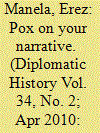|
|
|
Sort Order |
|
|
|
Items / Page
|
|
|
|
|
|
|
| Srl | Item |
| 1 |
ID:
134197


|
|
|
|
|
| Publication |
2014.
|
| Summary/Abstract |
The First World War was part of a global imperial and postimperial conflict that began in 1911 and did not end until 1923. Its supreme irony was that a war fought for the protection and expansion of empire in fact led to the dissolution of empires.
|
|
|
|
|
|
|
|
|
|
|
|
|
|
|
|
| 2 |
ID:
172583


|
|
|
|
|
| Summary/Abstract |
For some time now, historians have been venturing well beyond the spatial and methodological enclosures of nation-states that had long defined the modern discipline, writing more history that is variously described as international, transnational, transregional, global, or world history.
|
|
|
|
|
|
|
|
|
|
|
|
|
|
|
|
| 3 |
ID:
095527


|
|
|
|
|
| Publication |
2010.
|
| Summary/Abstract |
When Dr. Viktor M. Zhdanov, Deputy Minister of Health of the Soviet Union, arrived in Minneapolis, Minnesota, in May 1958 to attend the annual meeting of the World Health Assembly (WHA), the governing body of the World Health Organization (WHO), the visit was not routine.1 Reflecting Soviet premier Nikita Khrushchev's new policy of "peaceful coexistence" with the West, it marked the first time that a Soviet delegation had been sent to that forum since the establishment of the WHO ten years earlier.2 And Zhdanov made his mark, calling on the organization to launch a global campaign to eradicate smallpox, one of humankind's oldest and deadliest diseases. Mindful of the meeting's venue, he began his call with a quote from a letter that U.S. president Thomas Jefferson had written to Edward Jenner, discoverer of the smallpox vaccine, more than a century and a half earlier. The discovery, Jefferson had written the English physician in 1806, would ensure that "future nations will know by history only that the loathsome small-pox has existed.
|
|
|
|
|
|
|
|
|
|
|
|
|
|
|
|
| 4 |
ID:
163131


|
|
|
|
|
| Summary/Abstract |
The ideological clash between US President Woodrow Wilson and the Russian Bolshevik leader Vladimir Lenin, which began when the Bolsheviks took power in Russia in late 1917, was a defining moment in the international history of the twentieth century. Throughout his time in power, how-ever, Wilson viewed the Bolshevik threat as merely one part of the global crisis of his era, a crisis that encompassed not only the ongoing world war but also a set of longer term historical forces shaping developments both at home and abroad. So in order to understand Wilson's response to Lenin and the lessons it has for our time, we must first consider the historical context of that relationship.
|
|
|
|
|
|
|
|
|
|
|
|
|
|
|
|
|
|
|
|
|